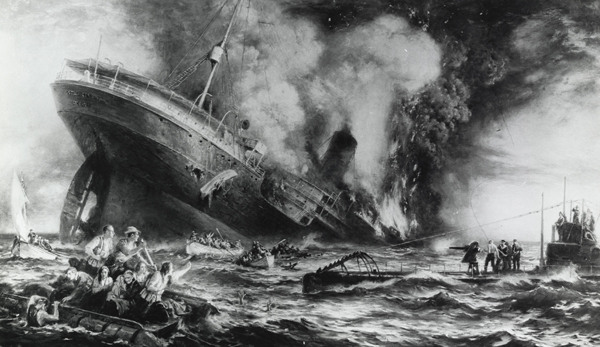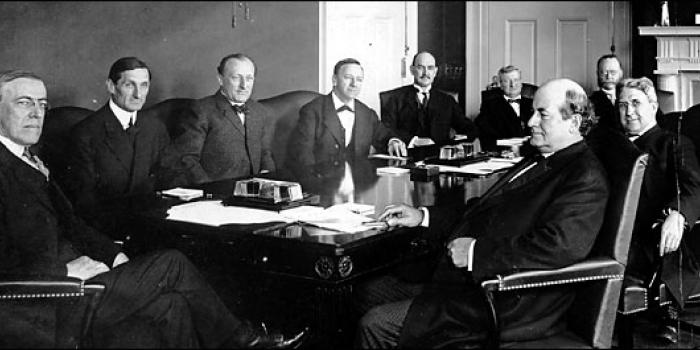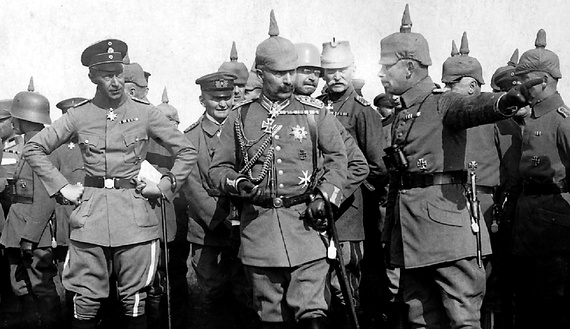Lusitania Episode Takes Months to Resolve;
Kaiser Calls Wilson Impertinent.
A Hideous New American Weapon
Special to The Great War Project
(21-22 July) Relations between the United States and Germany are increasingly tense.
The sinking of the British ocean liner Lusitania in May results in the death of nearly 1200, including 124 Americans. It splits President Woodrow Wilson’s cabinet.
Wilson takes weeks to fashion a response.
His goal: to force Germany to end its submarine warfare altogether.
Emotions run so high that Wilson’s Secretary of State William Jennings Bryan believes the president’s policy of neutrality is not neutral at all.
Bryan concludes Wilson is too pro-British, too anti-German.
Wilson believes the United States should be permitted to trade with all sides in the conflict.
But as a result of Britain’s very effective blockade of Germany, in fact the trade that the US does with the belligerents favors Britain.
US weapons sales and huge bank loans are quite clearly meant to help the British war effort.
As an example, in the spring of 1915, just a day before the sinking of the Lusitania on May 7th, the Cleveland Automatic Machine Company publishes a full-page advertisement in a weekly trade journal, “displaying an automatic machine that produced a new type of shrapnel shell,” writes historian and Wilson biographer Arthur Link.
The shell combines two acids that ignite, causing a “terrific explosion, having more power than anything of its kind yet used.”
“Fragments become coated with these acids in exploding and wounds caused by them mean death in terrible agony within four hours if not attended to immediately.”
In the trenches of the Western Front it is hardly possible to treat the wounded so quickly.
Given Britain’s blockade of Germany, this advertisement is aimed at only one potential buyer: Britain.
A German newspaper picks up this ad in June, and many German newspapers follow, calling the weapon “monstrous.”
It comes to the attention of the German leadership and public just as Wilson is pressing Germany to end its policy of unrestricted submarine warfare.
Discussions, often heated, continue among Wilson’s cabinet well into the summer a century ago. They are focused on how to respond to Germany’s submarine campaign, which clearly puts Americans crossing the Atlantic at risk.
One casualty of these arguments is Secretary of State Bryan himself. He resigns on June 8th, not long after an outburst during a cabinet meeting, when he charges, “You people are not neutral. You are taking sides.”
Finally on the 21st of July Wilson completes a letter of protest to the German government. At first glance, it is uncharacteristically harsh, and according to historian Arthur Link, blasted any hopes that Wilson would welcome German proposals for a modus vivendi.
Wilson’s note to the German’s “made a direct threat of war, or at least of a rupture in diplomatic relations, if any new incidents occurred.”
When the German Kaiser learns of this note, he reacts harshly, writing on the text he receives: “Immeasurably impertinent!”
But some in Germany see in Wilson’s note a subtle conciliatory tone, just as Wilson sees in Germany’s note a hint of flexibility.
It is clear that Wilson has no desire to go to war with Germany.
“The really critical phase of the controversy with Germany had passed,” writes Link.
Could the final result of the Lusitania episode be to clear the air in German-American relations? “So Wilson and many of his advisers believed,” writes Link. “It would all depend upon events of the next few weeks. They would show whether the submarine crisis was actually ended and the President could strive in all earnestness for freedom of the seas, or whether the future would contain renewed tension and perhaps war between Germany and the United States.”



